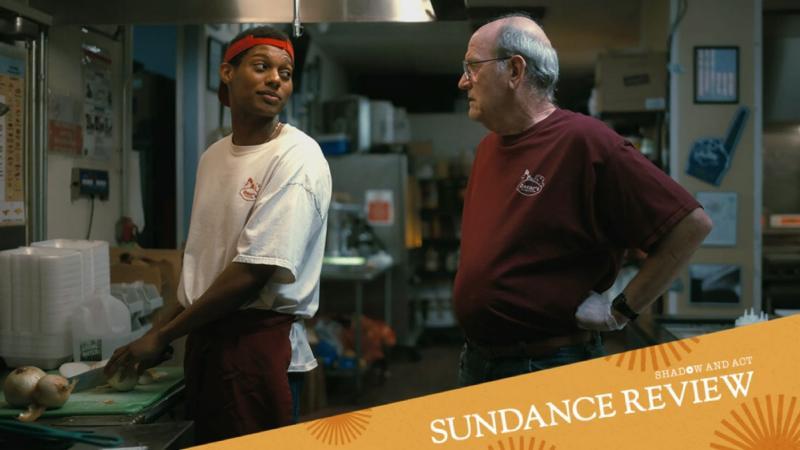The 2016 Presidential election revealed just how divided America can be. Many people across the country seemingly voted against their best interests for a presidential nominee whose policies would do more harm than good for the average working-class American. The election showcased, yet again, how many people will cling on to hatred, bigotry and racism because the privileges of whiteness are the only things they have of value.
In The Last Shift, filmmaker Andrew Cohn offers a birds-eye view of working-class, small-town America. The narrative showcases two lives that intersect, bringing about frustrating results.
Albion, Michigan is a town that the rest of America has forgotten. Stanley (Richard Jenkins) has lived there his entire life. He’s worked the graveyard shift at Oscar’s Chicken and Fish for the past 38-years, where he makes less than fifteen dollars an hour.
Stanley is exceptionally prideful about his life’s choices. He’s content in the grind of his daily work, his rented room in a flophouse and the evenings he spends playing darts and drinking Mountain Dew with his buddy Dale (Ed O’Neill). However, Stanley is ready for the next chapter of life. He’s decided to retire from Oscar’s, earn his driver’s license and drive down to Sarasota, Florida to get his ailing mother out of her hellish nursing home.
Before his final shift, Stanley’s boss, Shazz (Dolemite Is My Name‘s Da’Vine Joy Randolph), has tasked him with training his replacement. Jevon (Shane Paul McGhie) is a young Black father who has recently been released from prison after defacing a public monument. He’s full of lofty ideas about the world and has a passion for writing. However, his angst, aimlessness and the suffocating confines of Albion have left him feeling stuck with only the air mattress in his mom’s house as a life raft.
Like Stanley, Jevon wants to turn over a new leaf. Though he’s less than enthused about taking a job at Oscar’s, he’s determined to keep his parole officer at bay until he figures things out. The men initially clash. Jevon is annoyed with Stanley’s earnestness about the dead-end job and Stanley is frustrated with Jevon’s lack of interest. Their journeys and perspectives, of a Black male Gen Zer and a white male Gen Xer, are of two different worlds. However, with nowhere else to go, they slowly begin to see each other. Jevon isn’t pleased with his circumstances, but at the urging of his girlfriend Sydney (Birgundi Baker), he begins to take pride in his work. On the flip-side, after observing an outspoken Jevon, Stanley, who has never spoken up for himself in his life, begins to find his voice.
Unfortunately, that’s as far as The Last Shift goes. Not every film needs to have an overarching lesson learned, but this movie hardly says anything at all. Despite the tentative trust that they initially build with one another, Stanley’s refusal to acknowledge his white privilege stalls any real connection the men may have built. “That’s just frickin’ baloney!” Stanley screeches when Jevon calls out his privilege. “No one ever gave me nothing.” Yet, when it comes time to see Jevon in all of his humanity after an incident involving a group of Black and brown men, Stanley stereotypes Jevon and then hides behind his whiteness as if it will shield him from the choices he’s made and where his life has ended up.
The performances in The Last Shift are fantastic and nuanced. Jenkins masters the crotchety older man who feels like the world owes him something and McGhie shines as a bright but self-destructive young man in desperate need of being steered in the right direction. Despite all of this, The Last Shift fails to say anything profound about race and class in America.
There are plenty of moments when the film could’ve slotted in-depth conversations or debates, especially when Jevon asks Stanley about a Black man who was killed at the high school by a group of white students the same year Stanley was supposed to graduate. Instead, like many of the issues that Jevon and Stanley face, including lack of opportunity and classism, tough topics like race and consumerism are never unpacked.
By The Last Shift’s final act, Jevon and Stanley are like ships passing in the night. The film never gets to the root of their issues or the reasons for their disconnection. Instead, the film showcases the lack of empathy and casual racism that may very well lead to America’s undoing if never fully addressed.
The Last Shift premiered at the Sundance Film Festival on January 27, 2020.
Photo: Mott Hupfel/ Sundance Film Festival
READ MORE:
‘Sylvie’s Love’ Has The Immense Beauty Of An Old-Fashioned Romance
‘The 40-Year-Old Version’ Is An Ode To Black Womanhood And Putting Yourself On
‘Bad Hair’ Has A Lot To Say But Never Says It [REVIEW]
‘Charm City Kings’: Coming-Of-Age Drama On Black Dirt Bike Riders Gets Release Date
Aramide A. Tinubu is a film critic, consultant and entertainment editor. As a journalist, her work has been published in EBONY, JET, ESSENCE, Bustle, The Daily Mail, IndieWire and Blavity. She wrote her master’s thesis on Black Girlhood and Parental Loss in Contemporary Black American Cinema. She’s a cinephile, bookworm, blogger and NYU + Columbia University alum. You can find her reviews on Rotten Tomatoes or A Word With Aramide or tweet her @wordwitharamide
From Harlem to Hollywood, get the Black entertainment news you need in your inbox daily.

